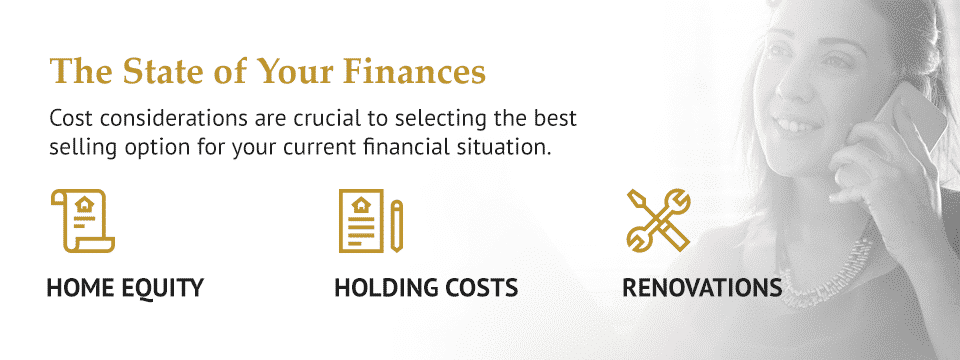
When is the best time to sell a home? At Cates Auction, we hear this question a lot.
So much so, we’ve aggregated our insights to put together a guide on the best time of year to sell your house. Whether you’re going the ordinary real-estate agent route, placing your property up for auction or taking matters into your own hands, there are numerous home-selling angles to consider — from target demographics and interest rates to welcoming showing weather. In fact, the best time of year to sell a house may surprise you.
Table of Contents
- Seasonality in the Housing Market
- Pros and Cons of Selling On-Season Versus Off-Season
- Knowing Your Buyers and When They’ll Be Looking for Property
- Market Demand and Interest Rates When Selling Your Property
- Current Home-Buying Process and Its Implications for Home Sellers
- What Else Should I Consider When I Put My House up for Sale?
- Contact Cates Auction to Sell Your House in Missouri or Kansas
1. Seasonality in the Housing Market
When you should sell your house is one of the most pressing questions for sellers today. Alongside determining a listing price, few considerations strike as close to home — literally and figuratively — as timing the market.
1.1 – When Should You Sell Your House?
Much of today’s advice surrounding seasonality of home sales comes based on when sellers think they should sell or when it is most convenient for them to do so, not objective buyer demand.
This makes sense, but it doesn’t delineate existing market trends in the season and month — and even day — that active buyers tend to seek real estate.

Your finances, season of life, and comfortable selling timeframe are the first critical considerations. What’s more, how you intend to list your house — through ordinary real-estate agents, for-sale-by-owner (FSBO) or auction — will further influence when you should place your home on the market, as each supports different timeline advantages.
1.2 – What Month Is Best to Sell a Home?
Traditional market wisdom states March through June is the best time of year to put a house on the market.
More specifically, the month of May is heralded as the seller’s sweet spot, according to data published by national property database, ATTOM. Homes sold in May via real estate specialists see premiums almost six percent above estimated market values compared to any other month.
It’s important to note, however, that seasonality trends effect FSBOs and ordinary sales, not auctions. Since real-estate auctions have a single pre-determined date, buyers and sellers alike know precisely when the sale will occur. No lingering uncertainties, no delays, no limbo. Auctions work well 12 months out of the year!
1.3 – Weather Conditions That Effect When to Sell a Home
Depending on where you live, the weather could further boost your ability to sell your home on a timeline that works best for you.
Inclement weather like rain or snow can slow down market demand for traditional listings, particularly in areas that experience sustained amounts during the winter season.
On the contrary, areas in the country that experience a snowbird effect see demand for housing increase during winter months, regardless of their own weather patterns. Sellers looking to target this demographic may choose to list closer to the winter months to attract appropriate parties. Auctions that offer the convenience of online shopping and buying can offset weather concerns.
1.4 – The Second Best Time of Year to Put a House on the Market
Traditionally, September through October typically sees the next best period of home sales. These months sit before the busy holiday season (November to January) and experience temperate weather, but remain a distinct second to the spring fever that hits beginning in March.
2. Pros and Cons of Selling On-Season Versus Off-Season
Buyers and sellers alike looking to make the most informed property decision should account for seasonal trends in their regional markets. Yet on-seasonality isn’t the end-all-be-all when it comes to listing properties. In both situations, there are benefits and drawbacks to bear in mind.
2.1 – Pros and Cons of On-Season Sales
- Pros: A larger prospective buyer pool, which leads to higher property valuations and likely a higher final sale due to demand. Real estate is one of the few markets that actually operates with a higher demand-higher pricing model. Larger supply also means houses cross-market each other as buyers considering one home notice others for sale in the process.
- Cons: Higher supply means more competition from other listings and more choices for buyers. As a result, buyers can be pickier, given the wider number and variety of homes available. This means as a seller, you may be forced to eat certain closing costs or make repairs and updates at a buyer’s request to finalize the sale — or outright sell the home for a price lower than expected. Remember, this isn’t the case if you sell via auction, though, where a minimum bid can be set, properties are sold as-is and urgency builds by the very nature of an auction’s atmosphere.
2.2 – Pros and Cons of Off-Season
- Pros: Off-season buyers are more likely to be intentional buyers, shopping around at this time for a reason. You can use this to your advantage, marketing to and attracting target demographics that match the positioning of your listed home.
- Cons: There is a potential risk of fewer buyers actively looking to buy and move.
3. Knowing Your Buyers and When They’ll Be Looking for Property

Another essential aspect to selling your home on a favorable timeline? Knowing your audience — that is, the very buyers you intentionally and ideally wish to attract.
There’s an art and a science to this. Knowing your buyer allows you to make smarter selling decisions. Everything from using the best real estate marketing materials and posting on the right Internet listing services to staging the home and even planting the right softscaping to greet visitors’ eyes is informed by immersion in target audiences’ minds.
Explore the following buyer demographics to learn how.
3.1 – Singles and Young Couples — a.k.a First-Time Home Buyers
Both individuals and young couples looking for their first home are more likely to begin that search in January and February. More than half of them are married, have a median age of 32, and settled at $182,000 for their first home with a six percent down payment.
Research also indicates this group most values detached, single-family homes. They’ll spend a longer amount of time perusing the market, as well, with first-time home buyer timelines averaging eight weeks and viewing nine to 10 homes. They find those prospective homes using Internet-first searches, turning to mobile devices to initiate 72 percent of viewings. Online auctions are especially suited to this demographic.
3.2 – Families
Buyers with families are most likely to search for their new home during the on-season. They tend not to want to pull kids out of school for any extended length, as well as, avoid house hunting during the holidays.
The best time to list your house if targeting families remains the spring and summer months. However, the best time to auction property — if going this route — will be more flexible. Families relocating due to new jobs, changes in family circumstances or other unforeseen events may be attracted to the linear security of an auction sale. Likewise, you’ll have more assurance and a tighter selling timeline from that audience. The convenience of online bidding is appealing to busy families.
3.3 – Downsizers
Downsizers are individuals ages 65 to 74 looking to reduce housing expenses or adopt a more maintenance-free lifestyle. Data shows they prefer both buying and selling during the warmest months of the year. Their house hunts will also be shorter, viewing fewer properties than other demographics and subsequently making a quicker decision.
There is also a lot of competition for homes that traditionally appeal to downsizers, such as bungalows, ranches, single-story homes, and condominiums. In fact, the average downsizer in 2017 sold their old home for $270,000 — only to move into their new one for $250,000. Auctions work exceptionally well in situations where strong competition is an excellent vehicle for driving up to the highest price.
3.4 – Vacation Properties: Beach, Lakehouses, Cabins and More
Vacation properties appeal to their own demographics and run on their own showing timelines.
Unlike conventional wisdom states, the ideal time to sell vacation properties is rather intuitive — When does the home, cabin, lake or beach house look best? That’s when it should be listed — not on a set seasonal schedule. Keeping in mind, of course, that buyers may want to have possession in time for a major holiday or prime vacation season.
You’ll likely attract individuals who use vacation properties as prominent investment assets or, even more common, buyers who weren’t actively looking, but caught wind of a property and couldn’t pass it up. Perhaps the vacation home sits in a destination they love and visit multiple times a year or is reminiscent of a beloved childhood spot. Either way, opportunity, and even sentimentality are critical here, not the season.
It’s important to note that all of these guidelines are just that — guidelines, not textbook rules. There is considerable variation in what causes buyers to actively look for homes, each driven by individual needs, opportunities, and circumstances. Many simply don’t fit into the generalizations above. And, the more compelling your property and your selling proposition are, the less these factors will impact the outcome.
4. Market Demand and Interest Rates When Selling Your Property
The housing market is a notoriously interwoven one, with macro- and microeconomic variables, banking policies, government regulation, and the general state of the economy all wielding a say in its health.
In this mix of influences, few are as essential as interest rates and the wider market demand in your homes area.
4.1 – How Interest Rates Impact the Buying and Selling Cycles
Lower interest rates benefit home buyers and sellers alike — just on different ends of the equation.
Simply put, they make it more favorable for interested buyers to acquire reasonable financing in the form of lower interest rates on their mortgages. This, in turn, produces more people eligible to get loans to buy a home, raising the number of potential buyers and therefore increasing the average housing price. For sellers, this is music to the ears, plus advantageous to new those homeowners, as less interest compounds across their 15 or 30-year loans. Even though most professional auctions allow for financing, auctions often generate more cash buyers and are therefore less reactionary to interest rate fluctuations.
4.2 – Knowing Your Local Housing Market’s Demand
Inventory levels in your housing region are also critical when best timing the market.
A high state of demand with low supply — that is, when the area’s buyer pool is large but available properties are tight — is called a seller’s market. Conversely, an area saturated with listings but lacking buyers is a buyer’s market.

Knowing when to put your property up for auction, FSBO, or through a real estate agent, means knowing what your area is currently experiencing. You can, therefore, position your home’s listing and its marketing appropriately for the current local supply and demand situation.
5. Current Home-Buying Process and Its Implications for Home Sellers
Finding the perfect buyer for your home is an active process. It involves strategic advertising, staging, and incentivizing while also ensuring ideal buyers find you in the first place — then fall in love with your home just like you did.
5.1 – Resources Buyers Use in the 21st Century
Any party selling property in 2019 and beyond must grasp this reality — buyers start their search online.
Nearly all generations of home buyers turn to the Internet when looking for properties. Both computer and mobile device searches dominate, driving over half of all prospective real-estate selections and — ultimately — purchases. This is especially true of younger and first-time homebuyers (ages 37 and below), as 92 percent of them will use online websites and directories to find and research prospective homes.
Only seniors are the exception. Buyers 72 and up will turn to a real estate agent or company first to begin their house hunt.
All this points to the importance of generating maximum exposure when marketing your property. This means comprehensive multimedia campaigns using both print and digital resources to get the most eyes as possible on your listing.
- Cates Auction Benefit: The weight of a dynamic multimedia housing campaign cannot be overstated in today’s market. This is where Cates Auction & Realty Company excels. We leverage aggressive auction advertising and a unique market message to saturate online local search results and realty listings — not just plop a sign in your yard and write a generic post for one MLS listing. Your home receives an optimized property profile, which provides the basis for customized ads that target and follow the right type of buyers. Our team has over 75 years of experience in the real estate marketing industry, all informing your home’s unique auction campaign.
5.2 – Length of Home Search
The current home-buying landscape also includes knowing the length of searches.
Buyer’s house-hunting timelines depend on age. Industry research points to the following averages, which should be taken into account if marketing and auctioning your home to a specific demographic:
- Retirees and seniors (ages 53-71): Ten-week average between searching, visiting, and deciding.
- All other generations (ages mid-20s to upper 60s): Eight-week average between searching, visiting, and deciding. As a rule of thumb, the younger the buyer, the longer their buying process.
- Cates Auction Benefit: Real-estate auctions compress the timelines of the home-selling process. Auctions create unparalleled buyer urgency in that they have a predetermined sale date, incentivizing ready-and-willing buyers to purchase “as-is.” This mitigates the risks of prolonged negotiations and unpredictable market tendencies that draw your listing out indefinitely — the bane of many trying to sell today.
6. What Else Should I Consider When I Put My House up for Sale?
To experience the best home selling process possible, sellers should look beyond seasonality in the housing market. Take into account both your current needs and long-term goals. These must align to sell your property in a way conducive to your realistic lifestyle and will include the following considerations.
6.1 – The State of Your Finances

Cost considerations are crucial to selecting the best selling option for your current financial situation.
- Home equity: How much of your home do you truly “own” — that is, how much of your mortgage loan and interest have you paid off, plus has your home’s value appreciated? Calculating your home equity is essential to set a budget for your next home or even borrow against home equity. This should be done using empirical sales data, not by adding up your expenses or comparing it to other rumored sales.
- Holding costs: Holding costs are those incurred while a house sits on the market. As a seller, you are responsible for paying them, including utilities, property taxes, maintenance costs, insurance, and the current mortgage. Trying to time the market can result in an accumulation of these holding costs that quickly outweighs or reduces the final sale’s profit. This is especially true for vacant properties that cost more to insure and maintain.
- Renovations: Many sellers make strategic renovations on their homes to grab more buyers’ attention and boost the sales price. Renovations can be pricey, though, without any guarantees you’ll see a return on investment (your choices may or may not match your buyers’!). In auctions, homes are sold as-is, without any expectations of the current owners doing additional work.
6.2 – Life Changes That Require a Quick Home Sale
Under certain circumstances, you can’t wait around for the best time of year to sell your home. There are a number of such situations where “timing the market” isn’t the primary concern:
- Job promotion or relocation
- Helping an elderly parent downsize and relocate
- A medical situation or life stage that requires close access to hospital and/or family
- Marriage
- Divorce
- Retirement
- Death
6.3 – How Long It Takes to Put a House on the Market
There are three primary options for getting your property listed and sold — through ordinary real-estate agencies, through auctions, or by independent FSBO.
Each carries its own timeline averages. Don’t be afraid to do your research, selecting the sales option that genuinely fits your schedule, your finances, your risk tolerance, and more:
- Your desired turnaround time: Auctions provide the quickest turnaround between listing and sale, averaging only 30 days for the entire process. They also give sellers the ability to set that sales date so they know exactly when the process completes. What’s more, a “pre-auction offer” option allows qualified buyers to move even faster.
- Your level of expertise: A do-it-yourself approach — as is the case with FSBO — likely won’t afford the same level of expertise in your local market, effective advertising strategies, or in networking within target buyer pools. This only comes with a real estate agency or an auction company with Realtor and marketing professionals, like the 77 years of marketing expertise fueling Cates Auction & Realty Company.
- Your availability: Around-the-clock, hands-on commitment is demanded in FSBOs and even traditional sales. Looking for something more hassle-free? Auctions might be the right choice if you want to avoid getting mired in prolonged negotiations, complicated contracts, endless showings, excess paperwork, and costly renovations.
- Your wallet: Sellers risk eating expenses and paying additional fees when they sell themselves or alongside an agent. With auctions, buyers can’t ask sellers to take on additional costs or demand extra work, plus buyers pay all the real estate commissions.
- Your desired sales price: Auction partners and real estate agents help you saturate targeted markets to gain the broadest possible listing exposure and reach true market value. Auctions have the bonus of a uniquely compelling message and competitive bidding, helping you avoid under-and-overpricing mistakes common to traditional or FSBO listings.
7. Contact Cates Auction to Sell Your House in Missouri or Kansas
Cates Auction brings accelerated auction marketing expertise to each property it sells — and confidence to its clients that they’re getting the support they require in the sales timeline they need, tailored to exact circumstances.


